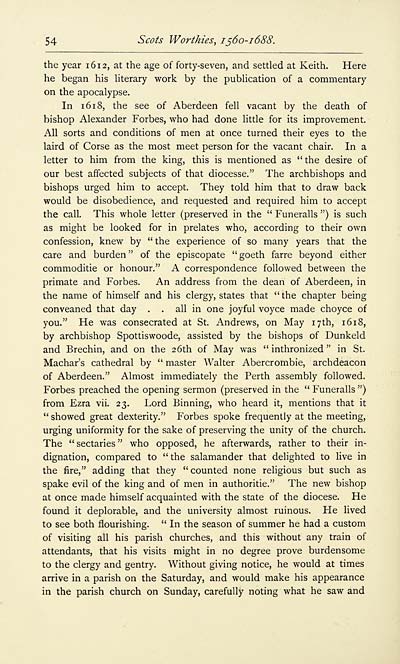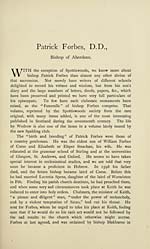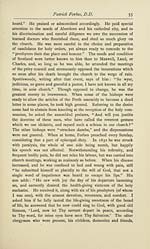Scots worthies, 1560-1688
(74) Page 54
Download files
Complete book:
Individual page:
Thumbnail gallery: Grid view | List view

54 Scots Worthies, i 560-1688.
the year 16 12, at the age of forty-seven, and settled at Keith. Here
he began his literary work by the publication of a commentary
on the apocalypse.
In 1618, the see of Aberdeen fell vacant by the death of
bishop Alexander Forbes, who had done little for its improvement.
All sorts and conditions of men at once turned their eyes to the
laird of Corse as the most meet person for the vacant chair. In a
letter to him from the king, this is mentioned as "the desire of
our best affected subjects of that diocesse." The archbishops and
bishops urged him to accept. They told him that to draw back
would be disobedience, and requested and required him to accept
the call. This whole letter (preserved in the " Funeralls ") is such
as might be looked for in prelates who, according to their own
confession, knew by "the experience of so many years that the
care and burden " of the episcopate " goeth farre beyond either
commoditie or honour." A correspondence followed between the
primate and Forbes. An address from the dean of Aberdeen, in
the name of himself and his clergy, states that "the chapter being
conveaned that day . . all in one joyful voyce made choyce of
you." He was consecrated at St. Andrews, on May 17th, 16 18,
by archbishop Spottiswoode, assisted by the bishops of Dunkeld
and Brechin, and on the 26th of May was " inthronized " in St.
Machar's cathedral by " master Walter Abercrombie, archdeacon
of Aberdeen." Almost immediately the Perth assembly followed.
Forbes preached the opening sermon (preserved in the " Funeralls ")
from Ezra vii. 23. Lord Binning, who heard it, mentions that it
" showed great dexterity." Forbes spoke frequently at the meeting,
urging uniformity for the sake of preserving the unity of the church.
The "sectaries" who opposed, he afterwards, rather to their in-
dignation, compared to " the salamander that delighted to live in
the fare," adding that they "counted none religious but such as
spake evil of the king and of men in authoritie." The new bishop
at once made himself acquainted with the state of the diocese. He
found it deplorable, and the university almost ruinous. He lived
to see both flourishing. " In the season of summer he had a custom
of visiting all his parish churches, and this without any train of
attendants, that his visits might in no degree prove burdensome
to the clergy and gentry. Without giving notice, he would at times
arrive in a parish on the Saturday, and would make his appearance
in the parish church on Sunday, carefully noting what he saw and
the year 16 12, at the age of forty-seven, and settled at Keith. Here
he began his literary work by the publication of a commentary
on the apocalypse.
In 1618, the see of Aberdeen fell vacant by the death of
bishop Alexander Forbes, who had done little for its improvement.
All sorts and conditions of men at once turned their eyes to the
laird of Corse as the most meet person for the vacant chair. In a
letter to him from the king, this is mentioned as "the desire of
our best affected subjects of that diocesse." The archbishops and
bishops urged him to accept. They told him that to draw back
would be disobedience, and requested and required him to accept
the call. This whole letter (preserved in the " Funeralls ") is such
as might be looked for in prelates who, according to their own
confession, knew by "the experience of so many years that the
care and burden " of the episcopate " goeth farre beyond either
commoditie or honour." A correspondence followed between the
primate and Forbes. An address from the dean of Aberdeen, in
the name of himself and his clergy, states that "the chapter being
conveaned that day . . all in one joyful voyce made choyce of
you." He was consecrated at St. Andrews, on May 17th, 16 18,
by archbishop Spottiswoode, assisted by the bishops of Dunkeld
and Brechin, and on the 26th of May was " inthronized " in St.
Machar's cathedral by " master Walter Abercrombie, archdeacon
of Aberdeen." Almost immediately the Perth assembly followed.
Forbes preached the opening sermon (preserved in the " Funeralls ")
from Ezra vii. 23. Lord Binning, who heard it, mentions that it
" showed great dexterity." Forbes spoke frequently at the meeting,
urging uniformity for the sake of preserving the unity of the church.
The "sectaries" who opposed, he afterwards, rather to their in-
dignation, compared to " the salamander that delighted to live in
the fare," adding that they "counted none religious but such as
spake evil of the king and of men in authoritie." The new bishop
at once made himself acquainted with the state of the diocese. He
found it deplorable, and the university almost ruinous. He lived
to see both flourishing. " In the season of summer he had a custom
of visiting all his parish churches, and this without any train of
attendants, that his visits might in no degree prove burdensome
to the clergy and gentry. Without giving notice, he would at times
arrive in a parish on the Saturday, and would make his appearance
in the parish church on Sunday, carefully noting what he saw and
Set display mode to:
![]() Universal Viewer |
Universal Viewer | ![]() Mirador |
Large image | Transcription
Mirador |
Large image | Transcription
Images and transcriptions on this page, including medium image downloads, may be used under the Creative Commons Attribution 4.0 International Licence unless otherwise stated. ![]()
| Histories of Scottish families > Scots worthies, 1560-1688 > (74) Page 54 |
|---|
| Permanent URL | https://digital.nls.uk/95151914 |
|---|
| Description | A selection of almost 400 printed items relating to the history of Scottish families, mostly dating from the 19th and early 20th centuries. Includes memoirs, genealogies and clan histories, with a few produced by emigrant families. The earliest family history goes back to AD 916. |
|---|

